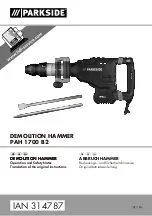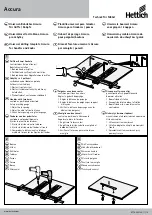
WARNING!
This appliance is not intended for use by persons
(including
children) with reduced physical, sensory or mental capabilities, or lack of experience
and knowledge, unless they have been given supervision or instruction concerning
use of the appliance by a person responsible for their safety.
Children should be supervised to ensure that they do not play with the appliance.
WARNING!
A fire may result if the appliance is not used with care, therefore:
•
be careful when using the appliance in places where there are combustible
materials
•
do not apply to the same place for a long time
•
do not use in the presence of an explosive atmosphere
•
be aware that heat may be conducted to combustible materials that are out of
sight
•
place the appliance on its stand after use and allow it to cool down before
storage
•
do not leave the appliance unattended when it is switched on.
ELECTRICAL SAFETY
WARNING!
Read all safety warnings and all instructions.
Failure to follow
the warnings and instructions may result in electric shock, fire and/or serious
injury.
Save all warnings and instructions for future reference. The term “power tool”
in the warnings refers to your mains-operated (corded) power tool or battery-
operated (cordless) power tool.
1. Work area safety
a.
Keep work area clean and well lit
. Cluttered or dark areas invite accidents.
b.
Do not operate power tools in explosive atmospheres, such as in the
presence of flammable liquids, gases or dust.
Power tools create sparks which
may ignite the dust or fumes.
c.
Keep children and bystanders away while operating a power tool.
Distractions can cause you to lose control.
2. Electrical safety
a.
Power tool plugs must match the outlet. Never modify the plug in any
way. Do not use any adapter plugs with earthed (grounded) power tools.
Unmodified plugs and matching outlets will reduce risk of electric shock.
b.
Avoid body contact with earthed or grounded surfaces, such as pipes,
radiators, ranges and refrigerators.
There is an increased risk of electric shock
if your body is earthed or grounded.
c.
Do not expose power tools to rain or wet conditions.
Water entering a power
tool will increase the risk of electric shock.
d.
Do not abuse the cord. Never use the cord for carrying, pulling or
unplugging the power tool. Keep cord away from heat, oil, sharp edges or
moving parts.
Damaged or entangled cords increase the risk of electric shock.
e.
When operating a power tool outdoors, use an extension cord suitable for
outdoor use.
Use of a cord suitable for outdoor use reduces the risk of electric
shock.
f.
If operating a power tool in a damp location is unavoidable, use a residual
current device (RCD) protected supply.
Use of an RCD reduces the risk of
electric shock.
3. Personal safety
a.
Stay alert, watch what you are doing and use common sense when
operating a power tool. Do not use a power tool while you are tired or under
the influence of drugs, alcohol or medication.
A moment of inattention while
operating power tools may result in serious personal injury.
b.
Use personal protective equipment. Always wear eye protection.
Protective
equipment such as dust mask, non-skid safety shoes, hard hat, or hearing
protection used for appropriate conditions will reduce personal injuries.
c.
Prevent unintentional starting. Ensure the switch is in the off-position before
connecting to power source and/or battery pack, picking up or carrying the
tool.
Carrying power tools with your finger on the switch or energising power tools
that have the switch on invites accidents.
d.
Remove any adjusting key or wrench before turning the power tool on.
A
wrench or a key left attached to a rotating part of the power tool may result in
personal injury.
e.
Do not overreach. Keep proper footing and balance at all times.
This enables
better control of the power tool in unexpected situations.
f.
Dress properly. Do not wear loose clothing or jewellery. Keep your hair,
clothing and gloves away from moving parts.
Loose clothes, jewellery or long
hair can be caught in moving parts.
g.
If devices are provided for the connection of dust extraction and collection
facilities, ensure these are connected and properly used.
Use of dust
collection can reduce dust-related hazards.
4. Power tool use and care
a.
Do not force the power tool. Use the correct power tool for your application.
The correct power tool will do the job better and safer at the rate for which it was
designed.
b.
Do not use the power tool if the switch does not turn it on and off.
Any power
tool that cannot be controlled with the switch is dangerous and must be repaired.
c.
Disconnect the plug from the power source and/or the battery pack from
the power tool before making any adjustments, changing accessories, or
storing power tools.
Such preventive safety measures reduce the risk of starting
the power tool accidentally.
d.
Store idle power tools out of the reach of children and do not allow persons
unfamiliar with the power tool or these instructions to operate the power
tool.
Power tools are dangerous in the hands of untrained users.
e.
Maintain power tools. Check for misalignment or binding of moving parts,
breakage of parts and any other condition that may affect the power tool’s
operation. If damaged, have the power tool repaired before use.
Many
accidents are caused by poorly maintained power tools.
f.
Keep cutting tools sharp and clean.
Properly maintained cutting tools with
sharp cutting edges are less likely to bind and are easier to control.
g.
Use the power tool, accessories and tool bits etc. in accordance with these
instructions, taking into account the working conditions and the work to
be performed.
Use of the power tool for operations different from those intended
could result in a hazardous situation.
5. Service
a.
Have your power tool serviced by a qualified repair person using only
identical replacement parts.
This will ensure that the safety of the power tool is
maintained.
GENERAL POWER TOOL SAFETY WARNINGS
WARNING!
When using mains-powered tools, basic safety precautions, including
the following, should always be followed to reduce risk of fire, electric shock,
personal injury and material damage.
Read the whole manual carefully and make sure you know how to switch the tool off in an
emergency, before operating the tool.
Save these instructions and other documents supplied with this tool for future reference.
Before you connect the equipment to the mains supply make sure that the data on the rating plate are
identical to the mains data.
This tool is double insulated therefore no earth wire is required.
If the supply cord is damaged, it must be replaced by an electrician or a power tool repairer in order
to avoid a hazard.
Note:
Double insulation does not take the place of normal safety precautions when operating this
tool. The insulation system is for added protection against injury resulting from a possible electrical
insulation failure within the tool.
Using an Extension Lead
Always use an approved extension lead suitable for the power input of this tool. Before use, inspect
the extension lead for signs of damage, wear and ageing. Replace the extension lead if damaged
or defective.
When using an extension lead on a reel, always unwind the lead completely. Use of an extension
lead not suitable for the power input of the tool or which is damaged or defective may result in a risk
of fire and electric shock.
HEAT GUN SAFETY WARNINGS


























